Analysis: What Wales can learn from the All Blacks in order to beat England

What a difference the New Year makes.
England looks to have reclaimed the form that made them back-to-back Six Nations champions in the first two years under Eddie Jones. They look like a fresher, more energetic side that is able to run a power carry game without sacrificing explosiveness, and play a tactical kicking game to control territory.
It appears the training load has been tapered off and the team is playing in optimal physical condition, as opposed to last year where the side looked sluggish.
Wales in Cardiff could be the only thing standing between England and a Grand Slam. Scotland, despite having beaten England last year, hasn’t won at Twickenham since 1983.
So, what do Wales need to do to beat England?
Build three lines of defence
Owen Farrell explained after beating France that they keep kicking in behind ‘because that’s where the space is’ and that they will ‘keep doing it when it’s there’.
If the last two weeks have taught anything, it is that England’s strength is their kicking game after a number of their tries were scored by exploiting undermanned kick coverages.
The first step to beating England is taking away that strength or ‘points pipeline’, and the best way to do that is invest in your backfield. Playing one sweeper and two fullbacks at all times will give you three lines of defence, taking away much of the space in behind.
If you lose on the first kick contest and England regain possession, you still have another fullback back to cover a potential second phase kick. Playing two-deep at all times also makes it difficult for any long kick to find grass.
When England are in their exit zones the open side winger can drop back and split the backfield into thirds by playing three-deep.
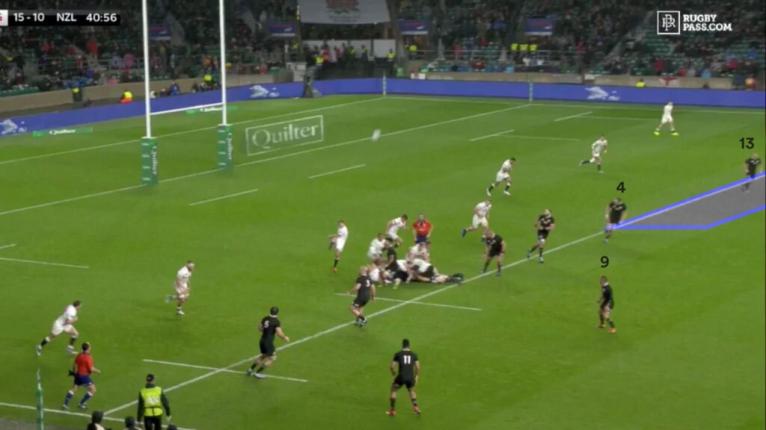
The All Blacks gave England plenty of open side space in exit zones when they played in Autumn. Just look how much room is outside Brodie Retallick (4) as Ben Youngs box kicks, leaving Jack Goodhue (13) to cover England’s whole backline.
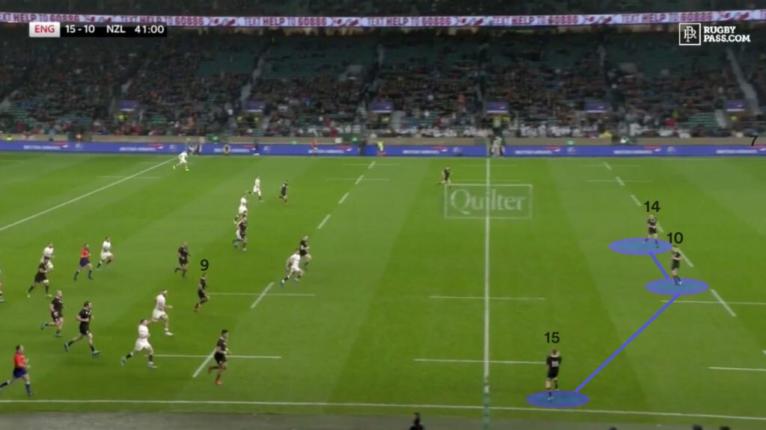
As McKenzie makes the catch, we can see three men back covering, Damian McKenzie (15), Beauden Barrett (10) and Ben Smith (14).
The All Blacks dared England to run it out of their own 22 the whole game and made sure the backfield had ‘thirds’ coverage in all exit situations.
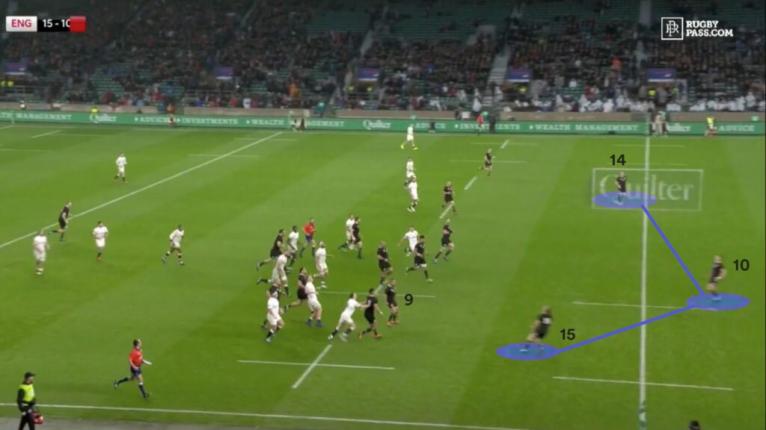
When England makes their way into your half, the wingers can play high to bolster the front line but you still have two fullbacks deep playing ‘halves’ coverage.
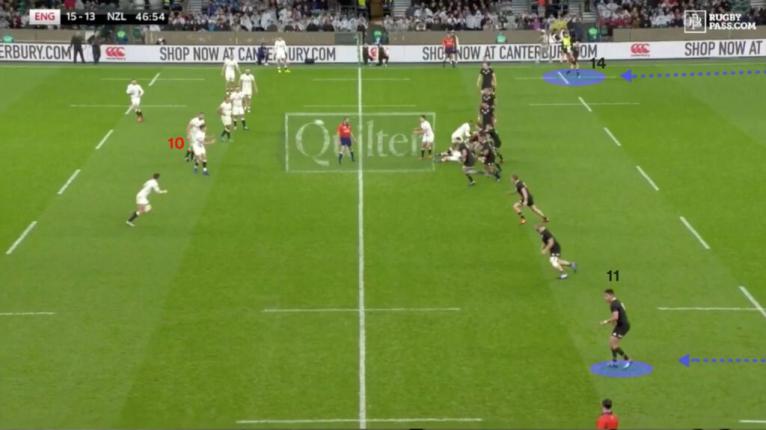
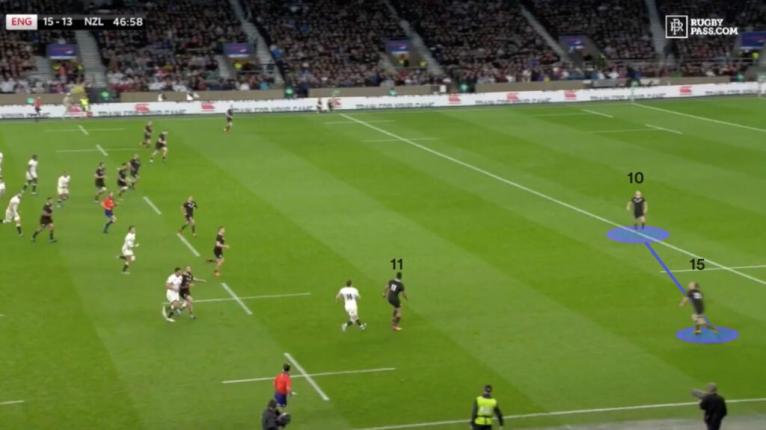
Both sides of the field are covered making it harder to find grass and pin the corners, a tactic that England employs often from 40-metres out.
For contestable aerial kicks, the wingers just need to focus on shielding as they aren’t required to turn and try and regather the kick like most cases when you play with one fullback. They can block to some degree like Rieko Ioane (11) above and re-route traffic away from the contest. They say the kick is only as good as the chase, and in this system, you can ruin the chase.
Seven out of eight high kicks went uncontested in the second half, with England regaining possession on zero kicks kept in play.
On two of McKenzie’s spilled catches, the second fullback insurance policy paid out – Barrett was there to jump on the loose ball. They say that two minds are greater than one so having two fullbacks must also be greater than using one.
England lost the kicking battle against the All Blacks in November, or you could argue at the very least, it was forced into a ‘stalemate’ that didn’t heavily influence the outcome of the match.
If you don’t want to invest numbers in your backfield against England’s kicking game, then good luck to you. You will need a back three with superior kick coverage skills as a unit and deliver to a high level of execution with little room for error. You can reduce the odds by implementing the same system as the All Blacks.
Wales played Gareth Anscombe at fullback last year against England and it was the only game in the tournament he did so. A Wales’ back three of Liam Williams on the wing (playing as a quasi-fullback), Anscombe again at fullback and Biggar at flyhalf can run the same system.
All three of them should be in the backfield for England’s exits while a combination of Williams/Anscombe or Williams/Biggar should play deep when England enters their half.
It won’t completely save Wales from making execution errors but will increase the probability that England won’t score from kicks, and that can be enough to keep the game close. Ireland was only down only by four, 17-13, when England landed the decisive blow in the 65th minute.
Taking away England’s primary means of scoring points is the first step to beating them.
Creating gain line wins through scheme
The addition of new defence coach John Mitchell is currently paying dividends for Eddie Jones.
However, so is the return of the bruising Vunipola brothers and the emergence of a world-class openside in Tom Curry, who looks like he’s put on 7-10kg of size in the last year and has been in great form with Sale.
England’s improved sharpness in game speed, combined with their physical pack is hammering teams behind the gain line in close channels. Curry, Wilson and both Vunipola brothers are dominating these areas.
With England’s big men in close, they were able to fly up and put on a dominant tackle, stopping runners in their tracks and often sending them backward consistently for the whole 80-minutes.
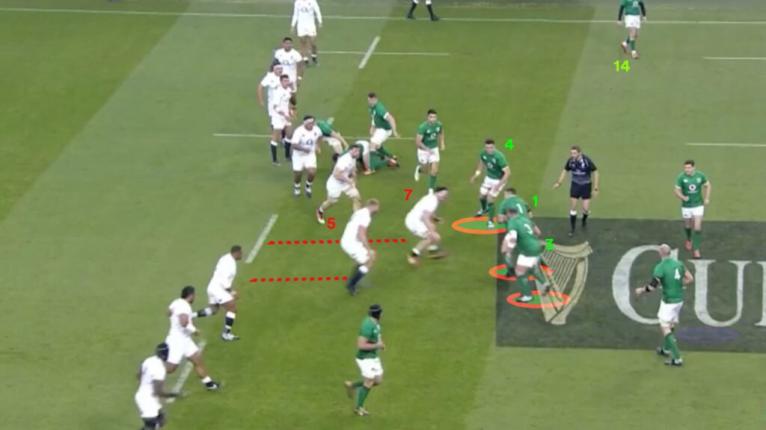
In order to neutralize and take them out of the game, Wales need to play with a few variations up their sleeve.
Ireland’s first phase working back from out wide past the 15-metre line is usually a carry with the middle runner in a three-man pod, see Cian Healy (1) above. Wales base pattern is a 1-3-3-1, using two pods, so they will encounter the same challenge with their ball-carriers as Ireland did, and perhaps run into potentially even more trouble.
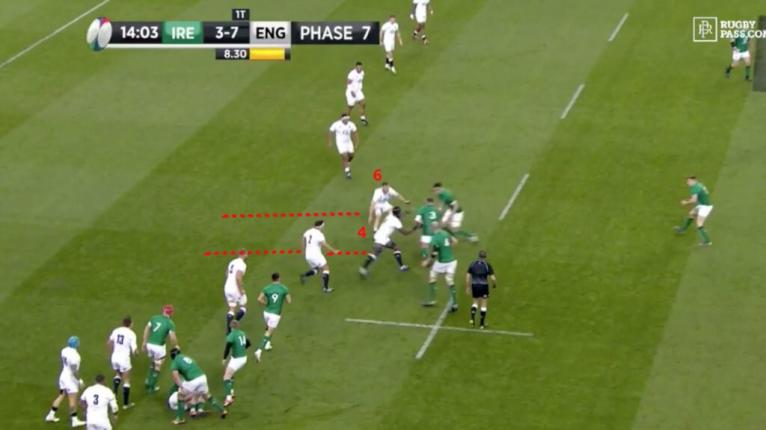
One solution to this is to play wider off nine and hit England where no line speed is coming.
By increasing the width of the first pass from the halfback and playing the third option in the pod, the attack can put stress on the 4th defender out from the ruck, a player who usually isn’t bringing any line speed, Kyle Sinckler (3) below.
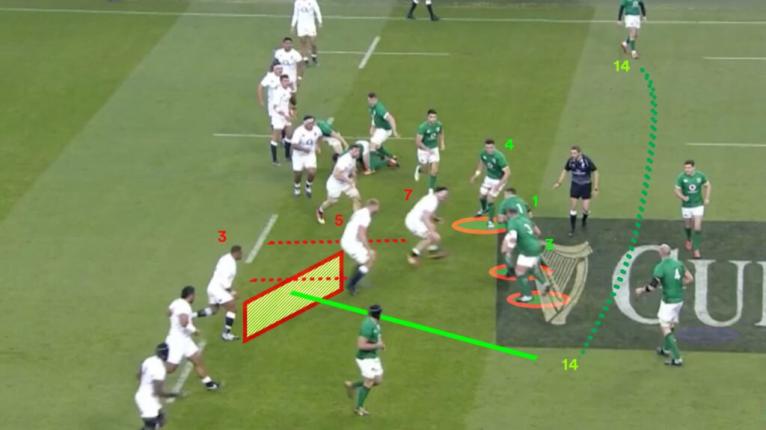
Play with an ‘empty’ blindside and move the blindside winger (14) back across as a tip option outside the pod, and use the tip pass to hit the disconnection between England’s 3rd and 4th defender.
Wales have a big power winger in George North that would be perfect for this, but will need quick ball from nine and consistency with the long pass from either halfback Gareth Davies or Tomos Williams.
This simple adjustment can scheme Curry and the Vunipola’s dominant tackles out of the game, by playing away from them and having them not tackle at all, whilst at the same time finding a way to manufacture gain line carries to work off for the next few phases.
If you can find the gain line on that first carry, the rest of England’s defence has to retreat and can’t get off the line as quickly.
A good tip pass to wingers like North coming at pace off the third pod runner not only will likely create go forward, it also has the chance to make a clean linebreak itself, especially between two disconnected tight five forwards in a fragmented line.
Alternatively, you can spread ’em out by implementing more two-pass phases through 10. Instead of playing pods off 9, you play them off 10, widening out the distance between the rucks and taking the interior ruck defenders out of the game.
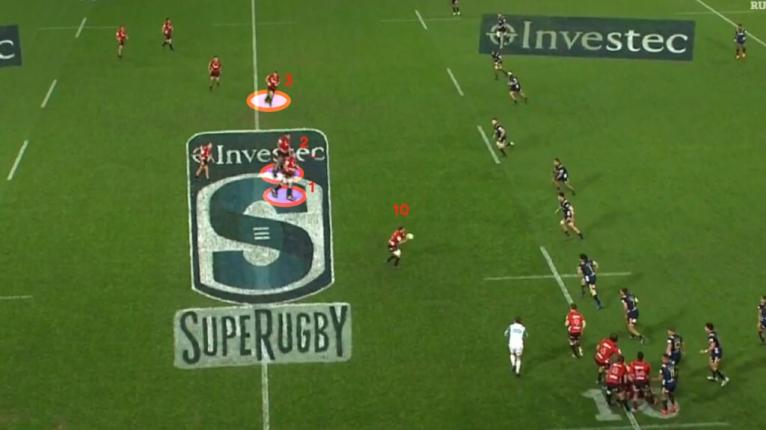
In the Crusaders 2-4-2 pattern, this is just the normal ‘modus operandi’.
We can see from above that from close to 5-metres in from touch, using Mitch Hunt to widen the next pod takes the next ruck to somewhere in midfield, and all of the Highlanders ruck defenders aren’t going to be making any tackles.
Widening the rucks can be done intermittently and however frequent you desire, dependent on how it’s working and whether it is having the impact you want, but is another way to scheme the likes of Vunipola and Curry out.
Taking away two things that are currently working for them, tries from kick pressure and dominant tackling in close, will go a long way to staying in the game against England. There will be a host of other ways to nullify England’s strengths through scheme alone, and Wales have enough of their own talent to cause England some problems.
The team that specifically game plans smartly to take away what England do well, which can be done in multiple ways, will be in with a decent chance to stop England capturing a Grand Slam.
Eddie Jones and Owen Farrell post-match press conference:







































